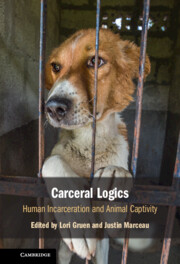‘Carceral logics permeate our thinking about humans and nonhumans. We imagine that greater punishment will reduce crime and make society safer. We hope more convictions and policing for animal crimes will keep animals safe and elevate their social status. The dominant approach to human-animal relations is governed by an unjust imbalance of power that subordinates or ignores the interest nonhumans have in freedom. In this volume, Gruen and Marceau invited experts to provide insights into the complicated intersection of issues that arise in thinking about animal law, violence, mass incarceration, and social change. Carceral Logics is remarkable in how far it expands and deepens our understanding of the animal protection movement’s carceral tendencies, the impulses that motivate them, and the alternatives before us. This book will undoubtedly not only shape research and debate, but help to inform the continued development of a more just and inclusive animal protection movement.'
Source: Mercy For Animals
‘Many of the most well-funded nonprofits in the animal protection movement have colluded with police, prosecutors, and for-profit animal torturing corporations to pursue mass human caging that has no discernable benefit to the animals they ostensibly seek to protect. With this brilliant, rigorous new volume, leading scholars and activists expose the intellectual dishonesty, ideological inconsistency, corruption, and lack of connection to other liberatory movements that have plagued the animal protection movement for too long. It is an essential call to change for all those who care about the value of human and nonhuman life.’
Alec Karakatsanis - founder of Civil Rights Corps, and author of Usual Cruelty
'What do we do when laws prohibiting animal cruelty fail to stop the vast majority of violence inflicted upon animals? Essential reading for anyone working to enact laws to protect animals, Carceral Logics insists that we measure our success and assess our failures by the real-world impacts such laws have on humans and nonhumans.’
Lauren Gazzola - SHAC 7 defendant
‘Carceral Logics invites readers into the messiness of the ways we treat each other and nonhuman animals. The essays resist simple equations of the experiences of human incarceration with nonhuman animal abuse and confinement, while challenging the assumptions that undergird each. What is revealed? That carceral logics belong to us, and dismantling these logics requires more than reform - we need systemic reimagining.’
Reginald Dwayne Betts - founder of Freedom Reads, and author of Felon



